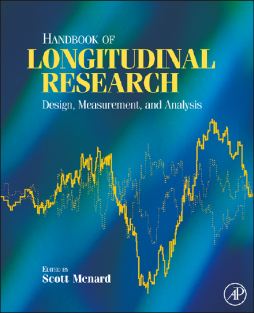
Additional Information
Book Details
Abstract
Longitudinal research is a broad field in which substantial advances have been made over the past decade. Unlike many of the existing books that only address the analysis of information. The Handbook of Longitudinal Research covers design and measurement as well as the data analysis.
Designed for use by a wide-ranging audience, this Handbook not only includes perspective on the methodological and data analysis problems in longitudinal research but it also includes contributors' data sets that enable readers who lack sophisticated statistics skills to move from theories about longitudinal data into practice.
As the comprehensive reference, this Handbook has no direct competition as most books in this subject area are more narrowly specialized and are pitched at a high mathematical level.
- Contributors and subject areas are interdisciplinary to reach the broadest possible audience (i.e., psychology, epidemiology, and economics research fields)
- Summary material will be included for less sohisticated readers
- Extensive coverage is provided of traditional advanced topics
"The Handbook of Longitudinal Research provides a set of chapters that treat the topic of longitudinal research in an informative and comprehensive fashion. With an increasing emphasis on accountability and evaluation for funded programs and for the precision that more sophisticated questions demands, this collection of chapters provides a valuable resource."
--Neil J. Salkind
Studio B
"This is an impressively thorough treatment of important issues in design and analysis of longitudinal research. It will serve as a definitive handbook. The first chapter is particularly useful as guidance for the selection of analytic methods that are presented in detail in subsequent chapters."
--Dr. Rebecca Warner
University of New Hampshire
"Menard has assembled an excellent collection of essays (all but three are original contributions) on a wide array to topics related to longitudinal research. Whether you are a novice to longitudinal research or a seasoned veteran, this collection will prove to be a valuable resource, with topics ranging from basic methodological issues (e.g., respondent recall, panel attrition, and panel conditioning) to advanced analytical concerns (e.g., spectral analysis, latent growth curve analysis, and discrete time event history analysis)."
--Finn Esbensen
University of Missouri-St. Louis
"The Handbook of Longitudinal Research will be an invaluable reference for organizational scientists engaged in serious longitudinal work. In particular, it should prove quite useful for designing investigations of organizational change—an arena where the use of longitudinal research designs has become essential."
--Richard W. Woodman
Texas A & M University
